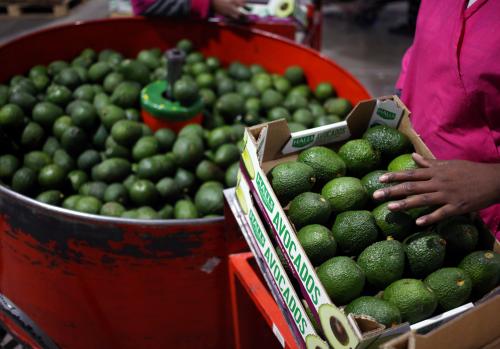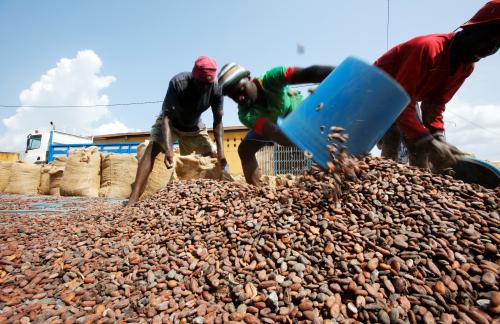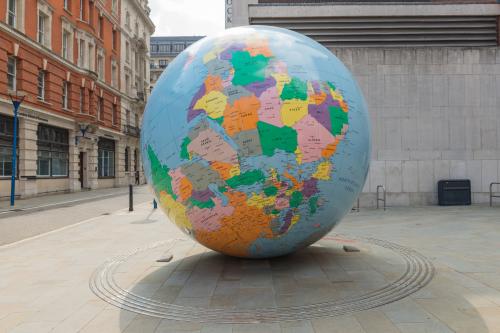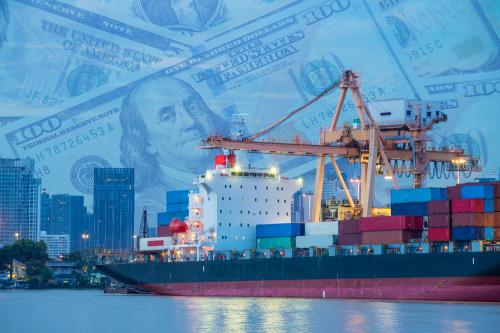It is difficult for Nigerians not to recoil at the government’s lackluster response to signing and ratifying the African Continental Free Trade Area (AfCFTA) (see Foresight Africa: Top priorities for the continent in 2019). The AfCFTA was introduced in March 2018. As of today, 52 out of 55 countries have signed the agreement and 18 have ratified it. Twenty-two countries are required to ratify the agreement for it to come into effect. That a heavyweight like Nigeria remains conspicuously on the sidelines at a time of increased momentum toward continental integration is baffling.
This state of affairs contrasts sharply with Nigeria’s prior activist roles on matters African in years gone by. In the past, Nigeria has used its political heft, economic power, and diplomatic and intellectual pedigree to seize the mantle of leadership that changed the course of African history.
In one example, Nigeria’s power play during the negotiations for Zimbabwe’s independence helped expedite the negotiations that led to the attainment of majority rule in Zimbabwe. At that time, Prime Minister Ian Smith of Rhodesia was on record that black majority rule would not happen in his lifetime, ostensibly relying on continued support by the U.K. government. Impatient with the slow pace of the negotiations, the federal government of Nigeria flexed its economic and political muscles by nationalizing British Petroleum assets, leading to the expedition of negotiations.
Nigeria also took a leadership role in the fight to end South Africa’s apartheid regime. Former President Olusegun Obasanjo’s August 1986 open letter to the U.K.’s Prime Minister Margaret Thatcher advocating sanctions to cripple the apartheid economy proved catalytic:
“Your ‘moral revulsion’ for sanctions struck me as unconvincing. The economic sanctions you so energetically pursued against Poland, Afghanistan and Argentina were brushed aside in your determination to withhold their application to South Africa. Yet to many of us there is only one significant difference: The victims in South Africa are black. Is sauce for the Aryan goose not sauce for the Negroid gander?”
In another action on apartheid, Nigeria took a leading role in coordinating a 22-country African boycott of the Olympic Games in Montreal, Canada, to protest New Zealand’s sporting links with South Africa. Isaac Lugonzo, then Chairman of Kenya’s National Sports Council, summed up the African position: “We cannot sacrifice principle for the sake of getting gold.” Overall, Nigeria’s uncompromising stance against apartheid helped to bring about regime change in South Africa.
Finally, and of particular relevance to the AfCFTA, Nigeria’s diplomatic, economic, and intellectual leadership helped lead to the formation of the Economic Community of West African States and the signing of the treaty in Lagos on May 28, 1975.
These examples are by no means exhaustive. They serve to illustrate that there was once a time when Nigeria played a leadership role in shaping Africa’s destiny.
Fast forward to today. The African Union had previously set the year 2063 as the deadline to achieve the “United States of Africa.” Leaders recognized that there are no shortcuts to this ambitious vision. In launching the AfCFTA, African leaders recognized that continental challenges require continental responses. Indeed, the agreement is a reaffirmation that the responsibility for Africa’s future lies in their own hands—collective action at a time of increased global headwinds.
From this broader historical perspective, Nigeria’s current reluctance to ratify the continental free trade area agreement amounts to a denial of the privilege to shape Africa’s future. While Nigeria continues to dither on the sidelines of history, other countries have assumed continental leadership and are moving on.
At the 2019 World Economic Forum, President Paul Kagame of Rwanda and President Cyril Ramaphosa of South Africa were showcased as leaders in the new global context. On the AfCFTA, both made salient points. First, with 1.2 billion people in 55 countries, the benefits of working together are far superior to operating as small, fragmented markets in the new global order. Second, the AfCFTA opens enormous opportunities for the manufacturing sector and for small, medium, and large businesses. This will boost intra-area trade, create jobs, enhance skills development, and assure best practices through smart competition among countries.
The status of ratification of the AfCFTA was discussed at the African Union 32nd Summit of the heads of states and governments in Addis Ababa, February 10-11. Nigeria remained conspicuous as it has not yet signed the agreement. The Summit also agreed on the continental leadership for the year ahead that include President Abdel Fattah Al-Sisi of Egypt as the current head of the AU in 2019, President Paul Kagame as the 2018 outgoing head of the AU, and President Cyril Ramaphosa as the incoming head of the AU in 2020.
The Nigerian presidential election has now been rescheduled to February 23. The winner will, no doubt, commence the task of prioritizing the many campaign promises made. This should in no way detract from the urgent task of meeting the nation’s continental obligations.
Africa needs an engaged and proactive Nigeria. To turn inward and be on the sidelines of history is clearly not a viable option for the continent’s largest economy. The time for action on the AfCFTA is now. Africa’s destiny depends on it.
The Brookings Institution is committed to quality, independence, and impact.
We are supported by a diverse array of funders. In line with our values and policies, each Brookings publication represents the sole views of its author(s).







Commentary
It’s time for Nigeria to sign the African Continental Free Trade Area Agreement
February 22, 2019